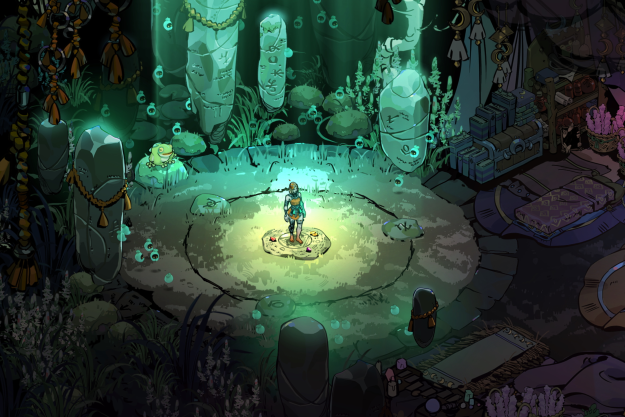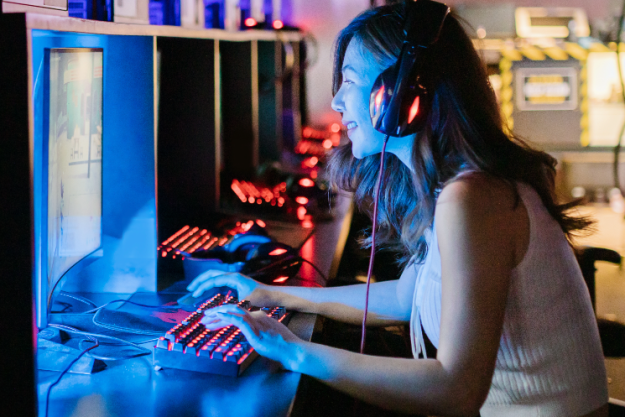
It’s a tall order bringing back a franchise that’s been dormant for over a decade but that’s just the beginning of the challenges facing lead designer Jake Solomon and his team at Firaxis making XCOM: Enemy Unknown. The turn-based strategy game for Xbox 360, PlayStation 3, and PCs pitting people against little gray space aliens isn’t exactly the sort of game that blows up the charts like Call of Duty in this day and age. That doesn’t scare Solomon though. He just wants to make the game he’s been dreaming of making for 18 years.
At E3 2012, Solomon took some time to discuss his history with the series, the trouble with the Internet keeping games timeless, modern strategy games, and the strange difficulty of life after making your dream game.
Why bring back XCOM now? Why is now the time for a retail turn-based strategy game on consoles?
I’ve always wanted to make this game. The original is why I got a computer science degree; it’s why I’m in the industry. It’s far and away my favorite game. Ever since I went to Firaxis, and I’ve been there for over 12 years, every time there was an opening in the schedule, I’d say, “You know what we should be making? XCOM!” The reason we haven’t done it before is that the things they did in the original XCOM that were core to the game, things like the fog of war and destructible environments, that stuff’s manageable in 2D but people still struggle with it in 3D. We had to do that and it was very challenging. Once we looked at the Unreal Engine when we started, we realized it was going to be possible. It was still going to be crazy but we had the technical stuff figured it out. On the flip side of that, there’s no point in not acknowledging that we are making a turn-based strategy game in 2012. We have the benefit, and our publisher has the benefit, of knowing about Civilization, the only really big turn-based strategy game. Every time we make one we sell millions and millions of copies. 2K was a little more intrigued by the idea when we said, “Look, we should make XCOM. We should make that strategy game.” Certainly there are a lot of fans out there for the original, but it just makes sense for our studio. They know we can make Civilization a success. The stars aligned with the technology and our publisher. Thank god for 2K. I’m not just blowing smoke here. I don’t think this would have happened with any other publisher. When I have conversations with them, it’s not about sales projections; it’s about the actual game, the experience, and how we can make it more fun.
The nice thing about the Internet is that it’s able to keep brands like XCOM potent when there hasn’t been a game in a long time. You don’t have to worry about hardware; a fan community well does the legwork of keeping the series alive and present. The problem is that when you bring it back, there’s a lot of cognitive dissonance. You have this dual challenge of trying to inform an entire generation of people who don’t know the brand about what it is while also satisfying all these people yammering about they think the game should be. What are the challenges inherent in resurrecting a brand like this now?
I’ve lived ‘em man, I’ve lived ‘em.
But how do you get past them?
It’s interesting. I benefit from, and there are drawbacks to, my being such a big fan of the original. I can certainly speak to fans with assurance and say that there is nothing about the original that I don’t know or haven’t thought myself. So I can talk to them in a very honest, not at all cynical way. If they come up to me and say, “I think it should be like this!” I can answer them in the exact same language and say, “Well this is why I disagree.” The downside to my being such a hardcore fan is that, as a designer, impartiality is really, really important. With your own designs, with anyone’s designs, you have to be able to say something is just not good. All good designers should have very little ego because you need to be hungry for someone to tell you, “I don’t like this.” I like hearing that. The problem with being a fan of XCOM is that I held on to a lot of things probably past when I should have.
The other side of that though is, you’re right, thank god for the Internet because it keeps something like XCOM alive. Because of that though, the people that have kept it alive, they have as much of an ownership stake in it as I do. I didn’t make this game originally, the Gollop brothers made the original XCOM. If Sid Meier says he wants to remake Civilization completely, people can moan, but he can say, “I made this game.” I don’t have that argument for an ownership stake. I wouldn’t be sitting here if it weren’t for the vocal fan base, because XCOM: Enemy Unknown wouldn’t have made sense to make. I take their ownership stake in this very seriously. What I wanted to make was a game that was true to the original. I wasn’t worried about making something for some mythical audience that may or may not exist. The concepts in the original game are still powerful.
The things that you do change have to come from an honest place and you can never make a decision cynically. My prototype was basically the original game, so when we changed things we could look at it and ask: Is this better than it was yesterday? Thanks to that I can talk to fans honestly and say I changed something because of X, Y, and Z and I hope when you play it you’ll understand.

Did you play [XCOM creator} Julian Gollop’s Ghost Recon: Shadow Wars on Nintendo 3DS?
I did, I did. It was awesome. It was interesting because, it was a different game [from XCOM], but it was interesting to see what he changed in [the style] as well.
You still see turn-based strategy on PC and iOS sometimes, but that’s one of the scarce few examples of that type of game on a Nintendo handheld or home consoles.
Very, very scarce.
Of those scarce few recent games, like Ghost Recon: Shadow Wars and Sega’s Valkyria Chronicles, what have you guys at Firaxis carried over? What have you guys learned from modern turn-based strategy?
I think what we all really liked about Valkyria Chronicles was the camera. We took that camera. We also looked at how Bethesda did V.A.T.S. in Fallout 3. Those two games had a pretty big impact on how the camera evolved, so instead of it just being top down to being behind the shoulder when we can, having these little action moments when we can. Ghost Recon, we didn’t take much from that, but it just heartening to see that [Gollop] had done some of the same things we did with classes and abilities and smaller squad sizes.
Nobody’s had the big, big strategy layer with the combat as well. Typically when people do this it’s mostly combat with a very light strategy layer on top so we’re out there on our own with that very big strategy layer and a very involved tactical layer as well.

Gollop’s game, Valkyria Chronicles. These are critically successful games. Huge successes critically. Not huge successes commercially. So what’s the secret to making sure that XCOM connects with this huge audience that you want?
If I could answer that with any sort of confidence…
Only four more months!
That’s the question. We’ve done a couple of things. We’ve made sure that the setting is the setting that is most appealing. The most appealing in light of the original XCOM games and the most appealing now. It’s in the modern world. We don’t want to go to sci-fi, we want people to recognize the environments. Frankly, after the original, the other XCOM games were less and less successful. There was something magic about that first one, and I think what it is is that you have Earth as one of the main characters. You have soldiers that you recognize, people that you recognize, settings that you recognize, so there’s more emotional resonance when you play the game. Oh my god, there are aliens in this gas station!
Plus it’s the more involved strategy layer plus the combat layer. You get this weird synergy with the game, where you spend all this time strategizing saying, “Oh man I want to go try this out now.” Then when you’re in the combat, you think, “I got it! Now I want to go layout my strategy.” You get this revolving game where you get this drive between the two elements. They feed each other.
The final thing is the consequences of XCOM. We stuck to the idea that the game is challenging and it has consequences. When soldiers die, they’re dead forever. The fact that you have consequences like that, it’s very hard to design for. You try to design a class system, you try to design all these things, and the hardest is you have to design a system where a soldier dies and the player can let them go without being too pissed off. It’s all about fairness. Because of these consequences though, once your soldiers start leveling up you have this relationship with them. There’s this tension that’s not there in other games and when you succeed you have a sense of accomplishment that’s not there in other games. It’s a much more concrete achievement because you know what the odds are and they’re punishing.
So this is it: You’ve made your dream game, the game you wanted to make when you were a kid. What comes after this, what’s the dream game now?
That’s a question I’m starting to struggle with. My wife, she’s worried. I’ve played XCOM forever; I’ve wanted to make XCOM forever. I’m so invested in this game, so she’s worried wondering what’s going to happen after this. I don’t know! I just don’t know. It’s hard to think of what to do after it. There are a lot of options, but I’m so deep into it—I’ve been deep into it for four years now—that even being at E3 is a very surreal experience. People keep coming up to me to talk to me about the game, but things have been so quiet for so long that I’m like, “Wait wait, how do you know about the game?!” My mind is resisting the idea that this is going to end at some point. That’s not to say I’m not ready for some down time but… I don’t know.


